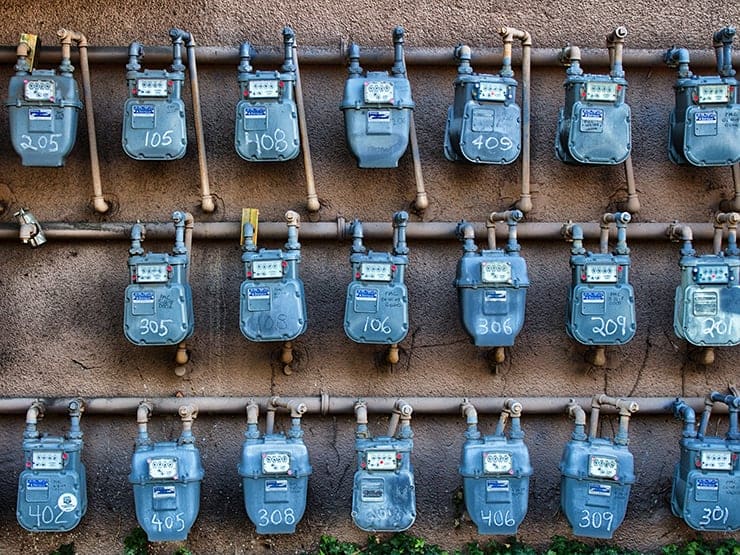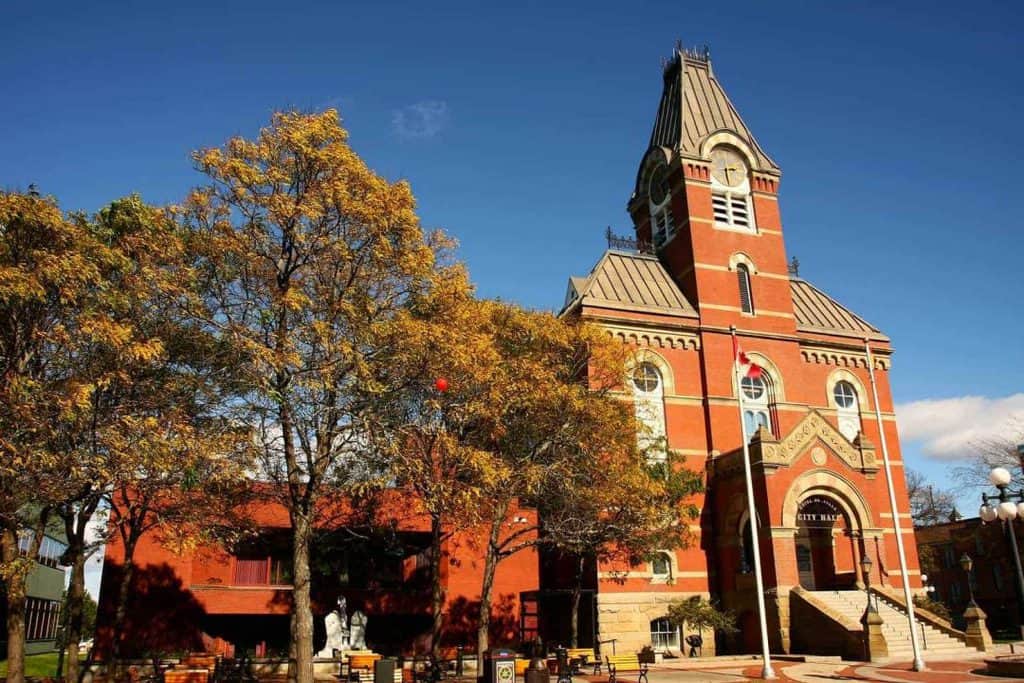“Fredericton City Hall” by Martin Cathrae is licensed under CC BY-ND 2.0
How Much Does it Cost to Live the FIRE Life near Fredericton?
Hello, and welcome to interview #6 in the How Much Does it Cost to Live the FIRE Life interview series! Part interview, part spending report, this series will introduce us to FIRE* seekers from all over the world.
They’ll reveal their essential spending and money-saving tips—all to help us learn new ways to save on our own expenses. As a bonus, we’ll also get to discover the unique advantages and challenges of living in different places around the globe.
*FIRE stands for financial independence, retire early. It’s also known as FI—financial independence. For more info, see my FI School series—it’ll teach you everything you need to know about FI (and FIRE).
About the interview series
I created an intro page for this interview series to help explain what it’s about, what’s included (or not) and why. I’ll also link to all the interviews from the intro page—so check back there to see the entire collection.
Jump to the series intro: How Much Does it Cost to Live the FIRE Life? (The Interview Series)
Disclosure: These interviews may include affiliate links. That means I’ll receive a commission if you make a purchase through my links—at no extra cost to you. Thank you!
Interview #6: T near Fredericton, New Brunswick
In today’s interview, we’ll meet T from the blog T on FIRE. She lives the FIRE life near Fredericton, New Brunswick with her husband, son and cat. On her blog, T shares her journey to FIRE, including topics such as: saving money, budgeting, becoming debt-free, and more.
T on FIRE is one of my favourite FIRE blogs, due in large part to T’s writing. Her writing style is just so entertaining and funny! (I tell her this all the time, and that she must keep blogging just to keep me laughing and entertained.) 😆
T’s blog is also quite the rarity—it’s one of only two FIRE blogs from Atlantic Canada. If you’re looking for a unique take on FIRE, from someone who lives where the air hurts her face, go check out T on FIRE.
But before you do, let’s get to know a little bit more about T and her family’s annual essential spending!
Table of Contents
Part 1
Part 2
Part 3
Part 4
Part 1: Getting to know you

Tell us about you and your family
I’m married to my husband of 15 years, and we have a 7-year-old boy. I am currently still in my “early” 40s, but that won’t last long. We recently acquired an adorable kitten. Life is more fun now with kid and cat.
Where are you in your journey to FIRE?
I discovered the concept of FIRE in October of 2018 and started my journey then. I’m a bit over ¼ of the way to FI, financially speaking. In the next couple of years, compound interest should speed up my progress.
I plan to FI in 11 years. I have a lot more hustling to do to get it done. I would like to work part-time doing something fun after the 11 years is up so I don’t lose my mind. So it will be a partial “Retire Early”. For further reading, please consult my “About Me” page on my blog, tonfire.com.
What type of FIRE are you aiming for? (FIRE, Lean FIRE, or Fat FIRE*)
How Chrissy defines FIRE, Lean FIRE, and Fat FIRE
Some people define Lean FIRE as under $40k in annual spending; FIRE as $40–$100k in annual spending; and Fat FIRE as $100k+ in annual spending.
However, I prefer looser definitions that are not based on hard numbers. That’s because $100k could be Fat FIRE in a small Canadian town but Lean FIRE in San Francisco. That said, here are my definitions:
- Lean FIRE: The essentials with little or no discretionary spending.
- FIRE: The essentials plus a comfortable amount of discretionary spending.
- Fat FIRE: The essentials plus a luxurious amount of discretionary spending.
Regular FIRE! We estimate around 50–60k spending for two of us. Primarily we want to do some travelling in our retirement, and that costs money. This should give us one large trip per year and a few smaller trips, hopefully!
Tell us about your living situation
We live in a detached single-family home. It is 2,400 square feet with an attached garage. We have a mortgage so we own a bit less than half of it. Our home is in the suburban area of Fredericton—a small city in Atlantic Canada.
We have no transit available from our home to the city, so we have to drive everywhere. Within walking distance (20 mins) there is a corner store. Sooo basically “in the sticks” as we say. A car is essential where I live. I live with my husband and 7 year old (and 6-month old kitten!)
Why did you choose to live near Fredericton?
This city is within two hours of our hometown, and both my husband and I immediately found jobs here after graduating from university. (Unlike many young people in Atlantic Canada, who have to move west to find work in their field.)
It is small, clean, beautiful, and *kind of* hip, in my humble opinion. There are lots of young people around as there is a university campus in the city. There is also a head of government in the city, so efforts are made to keep it in top condition!
We used to live in the city, but we chose to move to the suburbs for one reason—the arrival of our son. Firstly, the school in the suburb area is excellent, and secondly, we now have a much bigger yard for the kid to run around and play in. The yard backs on a beautiful wooded area that has tons of trails to explore.
In the future, we may move back to the city once our boy gets into middle school and beyond, since we like the idea of being able to use public transit, walk, and bike more places. We would like to have a small “home base”, and then spend much of the year travelling.
Part 2: The expenses
In this section, T shares her essential expenses and best money-saving tips. But before we get started, let’s review some important notes:
Important notes about the numbers
- Only essential expenses are included.
- Discretionary expenses (e.g. travel, gifts, etc.) are not included.
- Expenses are rounded to the nearest dollar.
- Expenses are displayed in the interviewee’s home currency.
- In this interview, the home currency is Canadian dollars.
- For your convenience, I’ve included a currency converter for each expense.
For detailed explanations about which expenses are included (or not) see my How Much Does it Cost to Live the FIRE Life intro post.
1. How much does housing cost near Fredericton?

Mortgage ($1,204/month; $14,448/year) 
One of the things we are trying to do more is shop around for the best mortgage rates. Right now rates are low, so we’ve re-financed in 2021 with a fixed, low rate to take advantage of that. Housing here is overall MUCH cheaper than in the larger, more populated cities in Canada.
Salaries are lower though, so the key is to find something right for you that doesn’t make you “house poor”. Our 2,400 square foot home was purchased for around $270k in 2016.
Property tax ($278/month; $3,336/year) 
I just started saving this year to pay my own property tax vs. going through the bank. This allows the money to grow a bit via a high-interest savings account until it’s due. I should have done that a long time ago! YNAB* makes it easy.
*This is T’s referral link for YNAB—please consider using it for a 34-day free trial!
Strata/HOA fees ($0) 
We don’t have any. Hurray!
Home insurance ($172/month; $2,064/year) 
Based on what I’ve seen from people aiming for FI in other provinces, home insurance seems much more expensive here. This could be due to different amounts of replacement coverage, or due to provincial variables? Regardless, I try to get quotes every year to make sure I have the best rate going.
Chrissy’s note: I cut our home insurance costs in half by switching to Square One Insurance—use my referral link for a $25 bonus!
Home maintenance ($270/month; $3,240/year) 
This category includes: home maintenance, repairs, cleaning, and improvements; household goods and supplies; furniture; and appliances.
I’ve been budgeting 1% of the purchase price monthly for home costs. The value here represents “regular costs”. In reality, the amount we have spent over the past two years has far exceeded this. Going forward, I’ll be adjusting the budget to 1.5 or 2%. The main expenses that drove up the “reality” number include:
- A voluntary heating upgrade to heat pumps (vs. baseboard heat) and add some insulation—$7,000. (This should pay for itself in about 15 years and increase the value of our home, so hopefully, we’ll at least break even eventually.) Here is a detailed post I wrote about the heat pump installation and payback period if you are interested in going this route.
- Partial roof replacement due to it being installed incorrectly, causing a leak—$3,600. I was so mad, I wrote a blog post about it.
We have more anticipated repairs coming up in the next couple of years (a new back deck, for example) that we are currently budgeting for. Overall, I’d say you cannot underestimate the cost of these major purchases over the years of home ownership!
OPTIONAL: Home equity opportunity cost ($5,000/year) 
About the home equity opportunity cost ‘expense’
This category was suggested by The Economist from FI Garage. The intention for sharing this is to calculate the opportunity cost of home ownership versus renting.
In other words: if you invested the amount that’s tied up in your home equity, how much would that be worth after one year of investing (based on a conservative 5% return)?
$100,000 x 5% = $5,000 in opportunity cost after one year of investing.
2. How much does transportation cost near Fredericton?

Vehicle insurance ($100/month; $1,200/year) 
I feel like the rates here are decent for long-term drivers with good records. That said, it is one of those things that will creep up if I don’t make efforts to get quotes each year! I do have higher deductibles and try to make sure I don’t over-insure our older, high-mileage vehicles.
Gas ($193/month; $2,316/year) 
Currently gas is $1.14 per litre CAD for regular unleaded. How does that compare to your neck of the woods? A few things we have done to save on fuel:
1) Get fuel at Costco or one of its competing stations. It’s usually about 4 cents cheaper a litre.
2) Purchase a fuel-efficient vehicle. We decided to purchase our first used hybrid car in 2020. We also like to try to reduce our environmental footprint so that was additional motivation.
3) TRY to do “batch” driving. I rarely go anywhere in my car unless it is on the way to work or on the way home from work. This seems to help reduce fuel consumption somewhat! Mr. Money Moustache would be proud of me for at least this one thing.
Vehicle maintenance ($450/month; $5,400/year) 
Neither I nor Hubs are mechanically inclined. However, he recently started doing our seasonal tire swaps. For the rest, we try our best to shop around at different mechanics to get the best price. Usually, this means avoiding the dealership or big shops where possible.
We still spend a fair bit on vehicle maintenance, although this will go down for a while since we got rid of our 2006 vehicle. That said our “new” car is 8 years old!!
Bike maintenance ($4/month; $48/year) 
I like to ride in the summer. However, typically it’s recreational vs. to avoid using the car. The main reason for this is that drivers in my suburb/city are insane. Biking from my home to town is actually risky. I see people doing it. I applaud them. But I’m not doing it until we move to a safer area.
Anyway, I get a tuneup yearly and the occasional repair so not too pricey! I cannot do anything myself, although if something goes wrong I might attempt to watch a YouTube video for an easy fix. That’s about as far as I usually get.
Parking and tolls ($79/month; $948/year) 
Hubs works downtown in the city so parking is at a premium. We were paying $126 but we now have a lead on a spot for $79 a month!! Tolls are not a thing in my province. There are literally none. There probably should be, as my province is poor. This government is not capitalizing on its strategic location in the country… the province will never be FI at this rate!
Transit ($0) 
As stated, there is no public transit from our home to work or anywhere else. The only transportation cost outside of owning cars is the occasional taxi when we drop the car off at the shop. This is rarely needed.
3. How much does food cost near Fredericton?

Groceries ($900/month; $10,800/year) 
This is one of our splurge areas when it comes to expenses. We spend quite a bit on groceries. I would say our biggest “crutch” is convenience foods for the kiddo and ourselves for busy nights and mornings. Things like prepared salads, frozen pizzas, and individually wrapped cheese strings for lunches.
I would love to try to reduce the amount of expensive prepared foods we buy, however it means sacrificing more time for meal planning and prepping, which I’m not willing to do right now. I do try to get our most frequent purchases on sale when possible.
Related reading: How to Save Money on Groceries (36 Valuable Tips) and Detailed Flashfood Review (Groceries for 50-70% Off)
Eating out ($135/month; $1,620/year) 
We don’t eat out much, despite there being plenty of lovely restaurants in the city. Hubs is not a huge fan of dining out. He is a huge fan of takeout. That said, we’ve been really good at keeping it reasonable, I think!
We recently did a no-spend challenge where we managed to not eat out for 34 days! We could certainly do it again in a couple of months to send those dollars somewhere more important. It’s nice to know that we can do without when we really put our minds to it.
4. How much do utilities and bills cost near Fredericton?

Natural gas ($0) 
Natural gas is not available in my neighbourhood. I do have a propane fireplace and a wood stove for heat during the cold Atlantic winters, however, most of our heat comes from electricity in the form of heat pumps and baseboard heaters.
Electricity ($265/month; $3,180/year) 
Electricity here is expensive since there is only one provider in my area. And, it’s a crown corporation* if that gives any indication on how well it is managed… I should probably try to stay away from political commentary. HA!
Anyway, it’s expensive, and really cold in the winter, which leads to more consumption. January average temps reach a high of -4ºC and a low of -13ºC, to give you an idea.
The biggest thing we did to reduce electricity use is replacing most of our baseboard heat with ductless heat pumps and add extra insulation in our attic. The second biggest thing we do is burn wood for heat.
Two areas where we could improve would be reducing dryer use by hanging clothes more often and installing automatic thermostats in areas where the baseboard heaters are used (both on my list of to-dos).
*Crown corporations are business entities that are established and run by the government. In other countries, they’re known as state-owned enterprises (SOE) or government-owned corporations (GOC).
Water ($78/month; $936/year) 
We don’t do anything special to save on our water bill except maybe avoid watering the lawn unless we are putting down new seed, or something like that. Being home so much last year did increase our consumption. This year, I’d like to install a rain barrel to water flowers and our small vegetable garden.
Garbage and recycling ($0) 
Garbage and recycling are included in our property taxes.
Internet ($100/month; $1,200/year) 
There are only two decent internet providers here, so it’s challenging to get a good rate with so little competition. The rate we are paying at the moment includes TV and home phone because for some silly reason that is cheaper than just having internet. Anyway, I have to call and harass them at LEAST once a year to get my rate lowered. It’s annoying.
Home phone ($6/month; $72/year) 
I have a VoIP phone set up which is relatively economical, however now I have a landline too as per the internet comment above. We don’t REALLY need either of these, but Hubs enjoys the security of a 3rd phone number (i.e. he doesn’t have to give out his cell to everyone). I get that.
Cell phones ($80/month; $960/year) 
This is for two phones through Public Mobile, which is THE BEST.
Chrissy’s note: I love and use Public Mobile too—use my referral code (X946WK) for a $10 bonus!
Streaming entertainment ($25/month; $300/year) 
We have Netflix and Disney+. I’m seriously considering cancelling Disney+ next month as we’re not using it much after bingeing The Mandalorian. The great thing is we can always sign back up later if we want to see something specific.
5. How much do other essentials cost near Fredericton?

Life and disability insurance ($156/month; $1,872/year) 
We have a considerable amount of life insurance. We set it up so that if one of us goes, the other is set for life and will not have to worry. Maybe we’re overdoing it, but I think we’ll stick with this approach at least until our mortgage is mostly paid off, at which point we’d lower our coverage. We have disability insurance through my husband’s employer, so that is taken care of.
Medical insurance ($103/month; $1,236/year) 
This is for a group plan through my husband’s employer.
Out-of-pocket medical expenses ($90/month; $1,080/year) 
This is for all the extras for the three of us. Mostly things like prescription fees, physio, massage therapy, dental charges, glasses and eye exams, and the occasional larger expense like my brand new hearing aid! Oh, how I love getting old.
Clothing and footwear ($77/month; $924/year) 
This was more than I expected. I took the average for the last two years. I went back to see what we spent all that money on. Lots of kid stuff. It turns out kids are expensive. Surprise! Despite my efforts to try to get stuff second-hand, there are just some things you have to buy new. Such as sneakers. It’s amazing how fast my kid goes through sneakers…
Personal care ($45/month; $540/year) 
This category includes: haircuts, toiletries and grooming services and supplies.
I took a little bit of a guess at this. I have only been separating out things like toilet paper from the grocery order since January. But I assume this is semi-accurate. This would include haircuts, toiletries, makeup and paper products mainly.
Technology ($23/month; $276/year) 
This category includes essential technology: software and hardware purchases, upgrades, maintenance, and repairs. Non-essentials (video games and consoles, e-readers, security cameras, etc.) aren’t included.
For this category, I went back through expenses for the last 2+ years. We had two computer failures that had to be fixed. We also replaced my ancient cell phone with a new-to-me iPhone 8.
We really have no essential software or apps that we don’t already own. We are looking into purchasing a laser printer this year for mostly essential use.
For tech repair and replacement, my biggest tips are:
Try fixing it first
If you’re a PC user, try to fix the computer you have vs. buying new when possible. If you have room, most are “upgradeable” with more RAM, or a new hard drive if yours dies. For simple things, you can usually DIY with a bit of help from YouTube if you’re not technically inclined.
We also found a trusty computer guy who doesn’t overcharge for work/parts when we need something more complex. If you are a Mac user, I have nothing. Macs are expensive, and not very DIY-friendly. If I wasn’t shooting for FI though, I’d probably own one. Ha!
Buy used phones
If your smartphone dies, it is never a good idea to get one through your cell provider that gets “paid off” via your monthly bill. (That said, do the math on your offer to make sure, but everyone here charges you way more than just buying a phone outright.)
Personally, I’m a fan of finding a good used phone through a reputable provider. I bought my used iPhone from The Fone Store in Toronto. It was a great price with free shipping, and I had the ability to return it if I wasn’t satisfied. I’ve had the phone for several months and I love it!
Part 3: Adding it all up
Now that we’ve detailed all of T’s essential expenses, it’s time to add everything up in some nice, organized tables!
Important notes about the numbers
- Only essential expenses are included.
- Discretionary expenses (e.g. travel, gifts, etc.) are not included.
- Expenses are rounded to the nearest dollar.
- Expenses are displayed in the interviewee’s home currency.
- In this interview, the home currency is Canadian dollars.
- For your convenience, I’ve included a currency converter in each section. I hope you find it useful!
For detailed explanations about which expenses are included (or not) see my How Much Does it Cost to Live the FIRE Life intro post.
How much does it cost to live the FIRE life near Fredericton?
1. Housing
| Expense | Monthly (CAD) | Annual (CAD) |
|---|---|---|
| Mortgage | $1,204 | $14,448 |
| Property tax | $278 | $3,336 |
| Strata/HOA fees | $0 | $0 |
| Home insurance | $172 | $2,064 |
| Maintenance | $270 | $3,240 |
| TOTAL | $1,924 (with mortgage) $720 (no mortgage) | $23,088 (with mortgage) $8,640 (no mortgage) |
Home equity opportunity cost (OPTIONAL): $5,000/year
2. Transportation
| Expense | Monthly (CAD) | Annual (CAD) |
|---|---|---|
| Vehicle insurance | $100 | $1,200 |
| Gas | $193 | $2,316 |
| Vehicle maintenance | $450 | $5,400 |
| Bike maintenance | $4 | $48 |
| Parking and tolls | $79 | $948 |
| Transit | $0 | $0 |
| TOTAL | $826 | $9,912 |
3. Food
| Expense | Monthly (CAD) | Annual (CAD) |
|---|---|---|
| Groceries | $900 | $10,800 |
| Eating out | $135 | $1,620 |
| TOTAL | $1,035 | $12,420 |
4. Utilities and bills
| Expense | Monthly (CAD) | Annual (CAD) |
|---|---|---|
| Natural gas | $0 | $0 |
| Electricity | $265 | $3,180 |
| Water | $78 | $936 |
| Garbage and recycling | $0 | $0 |
| Internet | $100 | $1,200 |
| Home phone | $6 | $72 |
| Cell phones | $80 | $960 |
| Streaming entertainment | $25 | $300 |
| TOTAL | $554 | $6,648 |
5. Other essentials
| Expense | Monthly (CAD) | Annual (CAD) |
|---|---|---|
| Life and disability insurance | $156 | $1,872 |
| Medical insurance | $103 | $1,236 |
| Out-of-pocket medical expenses | $90 | $1,080 |
| Clothing and footwear | $77 | $924 |
| Personal care | $45 | $540 |
| Technology | $23 | $276 |
| TOTAL | $494 | $5,652 |
Grand totals
| Expense | Monthly (CAD) | Annual (CAD) |
|---|---|---|
| Housing | $1,924 (with mortgage) $720 (no mortgage) | $23,088 (with mortgage) $8,640 (no mortgage) |
| Transportation | $826 | $9,912 |
| Food | $1,035 | $12,420 |
| Utilities and bills | $554 | $6,648 |
| Other essentials | $494 | $5,652 |
| TOTAL | $4,833 (with mortgage) $3,629 (no mortgage) | $57,720 (with mortgage) $43,272 (no mortgage) |
Part 4: Other expenses
This is a special section that’s just for fun! It’s the place for my interviewees to mention any expenses that they’ve done a really good job of optimizing and/or just want to share.
These expenses won’t be included in the totals (just to keep things as standardized as possible). I hope you find this section interesting and informative. Here are a couple of additional expenses that T wanted to share:
Childcare
One big “essential” expense we have is child care for 4–5 more years. At least it is tax-deductible! We save some money here by using a local in-home daycare, which has less overhead than a big organization. Also, it helps out a local business, which is great.
Replacement vehicles
Also not included in my essentials are replacement vehicles. We have a separate sinking fund for this in our budget—just for new car savings. We estimate when we’ll need a new car and how much we want to spend, and figure out the monthly savings rate required to meet the demand.
In terms of buying cars, my most favourite tip is to re-read this article from the Frugalwoods on how to get the most bang for your buck. I have pasted this link into Facebook conversations more times than I can count!
When you add this in, my annual spending is higher. Hopefully, when we retire we can cut back to one (or no) cars!
Chrissy’s closing thoughts
Thanks to T for sharing her family’s expenses! This interview was particularly interesting to me because T lives outside of Fredericton, which is the smallest city that’s been featured in this interview series so far (numbers sourced from Google):
- Fredericton, NB: 58,220
- Kitchener, ON: 242,400
- Vancouver, BC: 675,200
- London, UK: 8,982,000
My assumptions were off
I’d always assumed that lower-population areas would be cheaper in most categories. However, this series is helping me to realize that my assumptions were inaccurate. While vastly lower housing costs were expected, I wasn’t expecting utilities, groceries and internet to be more costly.
However, it makes sense—goods and services cost more to deliver to smaller populations that are farther from larger city centres. They don’t benefit as much from economies of scale or proximity to large distribution centres.
But the flip side is also true: some things are cheaper because of the smaller population. For example, T and her husband pay less to insure two cars than we pay for ONE! That’s just astounding to me.
Again, this makes sense: a smaller population translates into lower risks; hence, cheaper insurance.
A sustainable path to FIRE
On her blog, T often downplays her money-saving efforts as she shares her less-frugal expenditures. However, it’s clear that she puts a lot of thought and effort into cutting expenses and saving. (After all: they paid off $24,000 in non-mortgage debt in 15 months!)
Importantly, she and her family are doing all this without entering the zone of deprivation. Like most of us in the FIRE community, they spend according to their values and cut back on things that are less important. That’s a happier, more sustainable path to FIRE that I fully support!
Connect with T
I hope you enjoyed T’s interview! For more of her content, be sure to visit her on her blog, T on FIRE or connect with her on Twitter and Instagram.
Share your thoughts
Were you surprised by T’s essential expenses? Are any of them significantly different from where you live? Share your thoughts in the comments, along with your own money saving tips!
Carrie and her family live in a suburb near Detroit, Michigan. They keep their expenses low by making good use of one of my favourite FI superpowers!
Lionel and his girlfriend live in London, England—one of the world’s most expensive cities. Even so, Lionel shows us how it’s absolutely possible to live affordably there!
Visit the intro page to learn more about the what and why behind the series and access the complete list of interviews.
Support this blog
If you liked this article and want more content like this, please support this blog by sharing it! Not only does it help spread the FIRE, but it lets me know what content you find most useful. (Which encourages me to write more of it!)
You can also support this blog by visiting my recommendations page and purchasing through the links. Note that not every link is an affiliate link—some are just favourite products and services that I want to share. 🙂
As always, however you show your support for this blog—THANK YOU!








24 Comments
AnotherLoonie
April 14, 2021 at 8:15 pmWow, her vehicle maintenance is really quite expensive. Driving an old Mercedez I assume?
It’s so cool to get a little peek at (financial) life in Fredericton. Plus I loved her post about her experience swapping out some baseboard heaters with heat pumps. Keep up the great work, you two!
Chrissy
April 14, 2021 at 8:46 pmHi Another Loonie—yeah, I don’t envy Tanya’s vehicle maintenance costs! My guess is a bunch of major things went wrong on both vehicles.
I agree, it’s so much fun to take a peek into life in another part of the country/world. It’s as close as we get to traveling right now! Thanks for reading and commenting. 🙂
T on FIRE
May 8, 2021 at 6:23 amThings have gotten much better thankfully. I had zero car mainteance costs for the last 4 months straight. This month I have to get an oil change for one vehicle. But it’s improved so much!
Vanessa M.
April 15, 2021 at 7:29 amIs cost of food is higher in the east?$900 for three people seems a bit high
Chrissy
April 15, 2021 at 9:34 amHi Vanessa—I just took a quick peek at some grocery flyers in Fredericton. It appears their food prices are very similar to what I see here in Vancouver.
However, this is based on the sale items shown in the flyers. Perhaps regularly-priced items cost more.
Given that T does try to purchase items on sale whenever possible, my assumption is that her higher food costs are due to what she mentioned: that her family is willing to pay a premium for convenience/pre-packaged foods, to make life a little more sane.
I spend many hours EVERY DAY dealing with food in our house (planning, shopping, prepping, cooking, cleaning). But I’m a stay-at-home mom, so I have time to do this! I can’t imagine allocating this much time to food management in our house if I also worked full-time!
So, given that they’re a dual-income family, I think we can pretty safely assume that time is at a premium at T’s house. I can understand their decision to trade some of their money for convenience and freedom from the kitchen.
In addition, the time crunch of two working parents may also impact their ability to efficiently shop the sales or plan meals around sales. That can also add to food costs.
So, while I agree that T’s food costs are higher than expected for a family of three, I can understand why it might be. It’s a part-time job for me to optimize our food spending! I can’t imagine needing to do that after coming home from a full day of work.
I’m speaking for T here, so she may have different answers than what I’ve given. Hopefully my assumptions aren’t totally off-base!
T on FIRE
May 8, 2021 at 6:25 amI am CERTAIN we could save $ here if we tried! I think if the average FI person who took the time to actually eat and buy frugally would do much better than I seem to. HAHA! Honestly I would love to try to take 1 month and REALLY analyze our grocery spending to figure out where we would get the most savings. Your comment has inspired me…
Graham @ Reverse the Crush
April 17, 2021 at 11:18 amFascinating read, Chrissy and T! Thanks for sharing. It’s nice that the housing costs are low. It sounds like it would be much more affordable to buy a house out there compared to Toronto. Everything else seems fairly similar. I was also surprised by the vehicle maintenance costs. Based on that cost, I think you might as well just get a brand new Toyota Corolla and be problem free. It would save a lot of time and the payment could actually be cheaper. Since I am not mechanically inclined either, that is what I plan to do if I get a car.
Chrissy
April 17, 2021 at 7:04 pmHi Graham—New Brunswick’s affordable housing sure is attractive! It’s amazing how real estate prices differ so much around the country.
Several commenters here and on Twitter have shared similar thoughts on T’s vehicle maintenance costs. I wonder if it just costs more to service vehicles where she lives, or if it’s just a lot of unlucky repairs? Whatever the case, it sounds like these expenses will decrease a lot, now that T’s replaced their oldest car with a newer used one. 🤞
I agree, you (usually) can’t go wrong with Toyotas! They’re very good quality and stay trouble-free for a long time. We gave our 2001 Toyota Rav4 to my in-laws to use as a spare vehicle, and it’s still going strong!
T on FIRE
May 8, 2021 at 6:28 amThings have improved greatly, Thank the stars! Our older car is a VW and it’s actually been great for maintenance, and our newer car is a Toyota now (vs an old Honda CRV which had a lot of costly repairs). 2021 car costs as of today is $80 (for an oil change on the Toyota). Woohoo.
Mr. Dreamer @ VibrantDreamer.com
April 17, 2021 at 6:27 pmThank you T and Chrissy! Another interesting expense report. I totally relate for her expenses. We lived in Halifax for 6 years. The only “cheaper” expense in Atlantic Canada is Rental or House cost. However, I heard this is totally changed since the pandemic with many people returning to Halifax and a high demand on the housing market. NB is still the cheapest housing market in Canada (I think it is even cheaper than PEI).
Indeed, the options you have is very limited in those provinces. This can be Internet / Cable providers to food options. By far, the cheapest cities when it comes to food and grocery are the bigger cities (Montreal, Toronto, Vancouver) due to the many options and competition bringing the prices down a bit.
The other “crappy” part regarding Atlantic Canada is the lower average income comparing with other parts of the country and the higher income tax (Except QC).
There is a reason they say, Atlantic Canada is a good place for retirement and you see many young people move out for better opportunities. However, life is super chill, relaxed, and slow. People are generally happy and smiling. Stopping in a green light to let a pedestrian pass by is normal there. Try that in a big city and you will get smashed from the back!
Chrissy
April 17, 2021 at 7:22 pmHi Mr. Dreamer—it’s fascinating to get your insider knowledge! I had no idea NB has the cheapest housing market in Canada, and that everything else is indeed more expensive. That does align with what T shares in her post.
Your observation about utility and food prices also seems to be true. Before I started this series, my assumption was that living in a smaller city/town automatically meant everything would be significantly cheaper. Clearly, that is NOT the case!
The lower income, higher tax (and, apparently, poorer governments) in the Atlantic provinces sure stacks things against their residents. It’s a wonder that T is even able to consider FIRE, let alone actually achieve it! Based on everything you’ve shared, she deserves extra kudos for her hard work.
I love the idyllic picture you’ve painted of the friendly, welcoming community. That sounds lovely and charming. For many of us, it would be worth the trade-offs to live that slower, happier lifestyle. I can definitely see the appeal!
T on FIRE
May 8, 2021 at 6:27 amThings have improved greatly, Thank the stars! Our older car is a VW and it’s actually been great for maintenance, and our newer car is a Toyota now (vs an old Honda CRV which had a lot of costly repairs). 2021 car costs as of today is $80 (for an oil change on the Toyota). Woohoo.
David @ Filled With Money
April 19, 2021 at 5:08 pmWhat!! A $1200 a month in just housing costs?! It makes me wonder if I should be buying a house instead of paying a similar amount just for rent every month.. Hmm…
I like that the food costs are mostly in grocery spending. The amount of money someone can save on food by cooking and making food is so noticeable when looking at it over the long term. However, a little nice eating out budget here and there sure doesn’t hurt!
Chrissy
April 19, 2021 at 8:23 pmHi David—T’s housing costs are amazingly low. Real estate is apparently very affordable in Atlantic Canada! That does make renting less appealing.
I agree about the value of mostly cooking from home. there are HUGE savings to be had by doing that! However, as you say, it’s still nice to spend a little on eating out. That’s part of the fun and enjoyment in life!
Thanks, as always, for reading and commenting!
Maria @ Handful of Thoughts
April 20, 2021 at 7:10 pmAnother great interview Chrissy – I’m loving this series and am really glad you started it.
T thanks for sharing your numbers. I always like the transparency you have on your blog and this interview was no different.
Chrissy
April 20, 2021 at 9:17 pmHi Maria—thank you for reading and for the lovely comment! T is always so open with her finances, whether it’s sharing the good or the bad. That’s how we all learn and grow together. 👍
T on FIRE
May 8, 2021 at 6:31 amThank you Maria!!
GYM
April 20, 2021 at 10:51 pmPeople are so friendly in Atlantic Canada- I remember being honked at when I was there (in my car) and they just wanted to say hi. Interesting that the cost is not that much cheaper except for housing. Thanks for sharing this detailed post!
Chrissy
April 20, 2021 at 11:48 pmHi GYM—Atlantic Canada has always been on my bucket list, but now I think I need to visit sooner rather than later. I can’t believe how friendly people are there!
I’m also surprised by the costs. T’s interview helped me realize that my belief that everything’s cheaper in smaller cities/towns was inaccurate!
Tanya Shonaman
May 8, 2021 at 1:31 pmWhy, thank you. 😀 I attest that one could live much cheaper than I do…haha! I have a large-ish home and 2 cars…I think if you got a condo in town on the public transit system you could live for much less. And, maybe put a bit of effort into saving money on groceries, which I usually don’t 🙂
Teresa
April 22, 2021 at 3:12 pmWow! I always thought it would be much cheaper to live “back East”!!! I cannot fathom the house taxes, insurance being so high when the house prices are much lower than Vancouver. The utilities and groceries are also like Vancouver prices but the earning level you mention is lower so the myth that is is cheaper to live on the East Coast has been a myth all along. Thank you Chrissy so your enlightening blog!
Chrissy
April 22, 2021 at 3:55 pmHi Mom—it really is eye-opening to learn about the real costs of living in Atlantic Canada. I was very surprised that living in a lower-cost area (as far as real estate goes) doesn’t necessarily translate into overall lower costs.
However, based on the comments and what others have told me, Atlantic Canada is a beautiful, charming place to live. And even better—the people are warm, welcoming and friendly. Those factors are important, and could make it very much worthwhile for someone to live there, despite some costs being higher.
Thanks, as always, for reading!
T on FIRE
May 8, 2021 at 6:33 amI would agree but I would also say that one could live much cheaper than I am. I feel my life is pretty luxurious (big 2 storey house, 2 cars, free-for-all grocery shopping), and one could do much better if they were truly frugal (which I feel i am not, mostly due to my family demanding more!)
Teresa
April 22, 2021 at 4:11 pmHaving travelled through the Atlantic Provinces in our RV, we loved the scenery and most of all the friendly people we encountered so you are right! We cannot wait till it is safe to travel once again so that we can spend a couple of months enjoying the charm and ambience of the area!